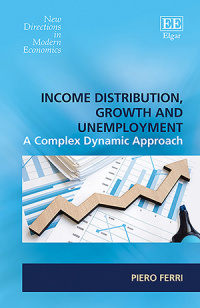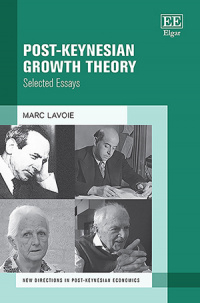Hardback
What’s Wrong with Keynesian Economic Theory?
可能在所有经济学中最奇怪的现象是缺乏批评的批评,专注于凯恩斯主义经济理论。凯恩斯人民需求管理一直处于历史上一些最严重的经济成果的中心,从20世纪70年代到20世纪90年代支出方案后,在日本的十年和更多的大十年和更多的历史上。在全球金融危机之后再次,它是无法实现的,在世界上任何一部分的刺激计划中没有取得成功,每个人都被遗弃为公共部门支出的重量恶化。本书汇集了凯恩斯主义经济学中最多的一些声乐批评。每个作者都试图解释凯恩斯主义理论的方法是什么,即寻求指导的方式可以理解,在哪里转向商业周期的更准确解释以及在经济衰退时发生的事情。
More Information
Contributors
Contents
More Information
One of the most striking phenomena in all of economics is the absence of a deep tradition of criticism focused on Keynesian economic theory. There have been critics but they are few and far between, even though Keynesian demand management has been at the centre of some of the worst economic outcomes in history, from the great stagflation of the 1970s to the twenty-year ‘lost decade’ in Japan that has been ongoing since the 1990s, and now, once again, the dismal recoveries that have followed the Global Financial Crisis. This book brings together some of the most vocal critics of Keynesian economics of the present time.
Each author attempts to explain what is wrong with Keynesian theory for those seeking guidance on where to turn for a more accurate explanation of the business cycle and what to do when recessions occur. The contributions are by scholars from a wide number of schools of economics, which include but are not restricted to Austrian, monetarist and classical perspectives. Written not just for economists, this accessible book is one of the few anti-Keynesian texts available and explains the inability of public spending and lower interest rates to have restored robust economic growth and full employment after the GFC.
The collection offers an antidote to contemporary macroeconomic theory. It is an essential text for anyone wishing to understand why no stimulus has been able to bring recovery to any economy in which it has been tried.
Each author attempts to explain what is wrong with Keynesian theory for those seeking guidance on where to turn for a more accurate explanation of the business cycle and what to do when recessions occur. The contributions are by scholars from a wide number of schools of economics, which include but are not restricted to Austrian, monetarist and classical perspectives. Written not just for economists, this accessible book is one of the few anti-Keynesian texts available and explains the inability of public spending and lower interest rates to have restored robust economic growth and full employment after the GFC.
The collection offers an antidote to contemporary macroeconomic theory. It is an essential text for anyone wishing to understand why no stimulus has been able to bring recovery to any economy in which it has been tried.
Contributors
贡献者:P. Boettke,P.L.杨润,康吉顿,下午Ebeling,R.W.Garrison,S. Horwitz,S. Kates,A. Kling,A.B。Laffer,P. Newman,G.Reisman,D.Impson,M. Skousen,P. Smith
Contents
内容:
介绍
1. The Keynesian Liquidity Trap: An Austrian Critique
Peter Boettke和Patrick Newman
2. What the Entrepreneurial Problem Reveals about Keynesian Macroeconomics
Per L. Bylund
3. A Critique of Two Key Concepts in Keynesian Textbooks
Tim Congdon
4. The Misdirection of Keynesian Aggregates for Understanding Monetary and Cyclical Processes
Richard M. Ebeling
5. Cycles and Slumps in an Overly Aggregated Theoretical Framework
Roger W. Garrison
6. The Problems with Keynesianism: A View from Austrian Capital Theory
Steven Horwitz
7. The Dangers of Keynesian Economics
史蒂文凯特
8.凯恩斯党的汇总问题
Arnold Kling
9.凯恩斯主义经济学家有什么问题?
Arthur B. Laffer
10. Capital, Saving and Employment
George Reisman
11. What’s Wrong With Keynesian Economics?
David Simpson
12. Move Over Keynes: Replacing Keynesianism with a Better Model
Mark Skousen
13.凯恩斯主义经济学的确凿断层线
彼得史密斯
Index
介绍
1. The Keynesian Liquidity Trap: An Austrian Critique
Peter Boettke和Patrick Newman
2. What the Entrepreneurial Problem Reveals about Keynesian Macroeconomics
Per L. Bylund
3. A Critique of Two Key Concepts in Keynesian Textbooks
Tim Congdon
4. The Misdirection of Keynesian Aggregates for Understanding Monetary and Cyclical Processes
Richard M. Ebeling
5. Cycles and Slumps in an Overly Aggregated Theoretical Framework
Roger W. Garrison
6. The Problems with Keynesianism: A View from Austrian Capital Theory
Steven Horwitz
7. The Dangers of Keynesian Economics
史蒂文凯特
8.凯恩斯党的汇总问题
Arnold Kling
9.凯恩斯主义经济学家有什么问题?
Arthur B. Laffer
10. Capital, Saving and Employment
George Reisman
11. What’s Wrong With Keynesian Economics?
David Simpson
12. Move Over Keynes: Replacing Keynesianism with a Better Model
Mark Skousen
13.凯恩斯主义经济学的确凿断层线
彼得史密斯
Index




